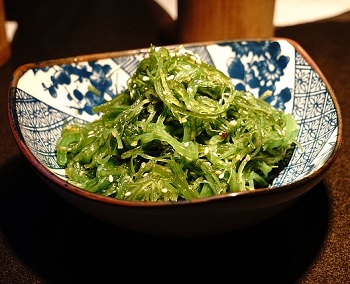You may have heard that it has a lot of nutritional values, but what are the effects of sea kelp on weight loss. We explain it all in this article… so keep reading to find out.
What is Sea Kelp?
Kelp is a type of seaweed. It grows in shallow parts of the ocean, and can grow so thickly that it looks like an underwater forest.
There are some specialty grocery stores and Asian restaurants that serve it fresh, and it has a slightly slimy, chewy, and dense texture.
Some people love to eat it this way, others, not so much. This green-brown seaweed can also be taken in supplement form, and has nearly no fat, carbohydrate, or even calories!
As a staple in Asian cuisine, those from the East have known for centuries that it’s a healthful addition to the diet, and have been enjoying it daily for its plethora of vitamins and minerals.
One of the great things about kelp is, it’s sustainable, grows quickly, is commonly available (in dried or supplement form). It is also one of the cheapest superfoods you can get your hands on, so you get a great bang for your buck.
The Effects of Sea Kelp on Weight Loss – How Does it Work?
Kelp is one of the few foods that’s naturally high in iodine, which is an essential mineral. There are iodine receptors in every cell of the body, where it helps with immunity and energy metabolism.
More importantly, the thyroid requires a great deal of iodine for proper production of its signaling hormones.
The thyroid is the master gland that controls things like fat burning or fat storage, as well as body temperature, and has a hand in immunity and heart health.
Kelp can supply the thyroid with the iodine it needs to function well. So it can go a long way in restoring the right fat burning hormone balance.
It’s possible for weight to fall off effortlessly, while you enjoy clearer, faster thinking, more energy throughout the day, and even less pain in your body.
Many people today suffer with a lower than average body temperature, and this can indicate thyroid issues. If you find your temperature is chronically low, kelp is definitely something that you want to try.
It’s important to consume iodine with other minerals and vitamins, since they are needed together to be absorbed and used.
Fortunately, iodine isn’t the only mineral that this plant is rich in, nor is it the only mineral we’re in dire need of.
Due to soil depletion, many of our plant foods don’t contain enough essential minerals such as zinc, chromium, manganese, and copper, as well as ones more commonly known like calcium and magnesium.
In all, kelp contains over 60 minerals, 17 of the amino acids. It also contains vitamins A, D, E, K, and several of the B vitamins.
Kelp is so rich in nutrients that smart gardeners use it to feed their plants. There are even kelp supplements for livestock and pets.
All these nutrients combine to deeply nourish our bodies and give our tissues what they need to work optimally. With this type of natural support, the body becomes healthier and the excess fat simply melts off.
For those that enjoy the flavor and texture, kelp can be a filling food that is extremely low in calories. So it’s a smart addition to your diet plan.
You can reduce your overall calorie intake while boosting your nutrition and supporting your weight loss efforts.
While eating kelp as food isn’t necessary since it’s available in supplemental form, it can add variety to your dishes.
If eating kelp isn’t for you, it’s available in capsules and powders. So you don’t have to miss out on all the wonderful benefits you can get from it.
There are also some diet supplements that contain kelp and other weight loss ingredients.
Effects of Sea Kelp on Weight Loss – Any Down Side?
For the majority of people, there is no down side. No side effects, issues, or complications. In a few rare cases though, some people have an allergy to iodine. For this reason you should add kelp slowly and in small amounts to see how you react.
Some people may experience an initial detox or adjustment period that may include fatigue, headaches, or stomach upset.
While it doesn’t happen often, see if these symptoms disappear slowly with use. This can indicate improved tolerance and nutrient uptake, instead of a true allergy.
Be aware of the source of your kelp, too. Some kelp harvested off the shores of Japan may be tainted by the radioactive runoff from the Fukushima incident.
Look for your kelp to be certified for origin. And if it’s from the waters around Japan, make sure it’s certified to be free of radioactive contamination.
Leave a Reply